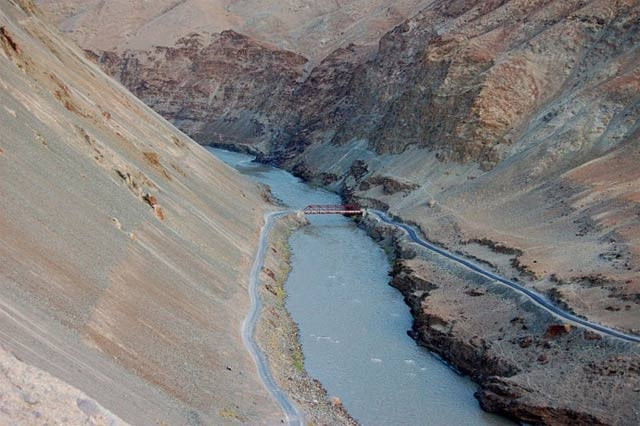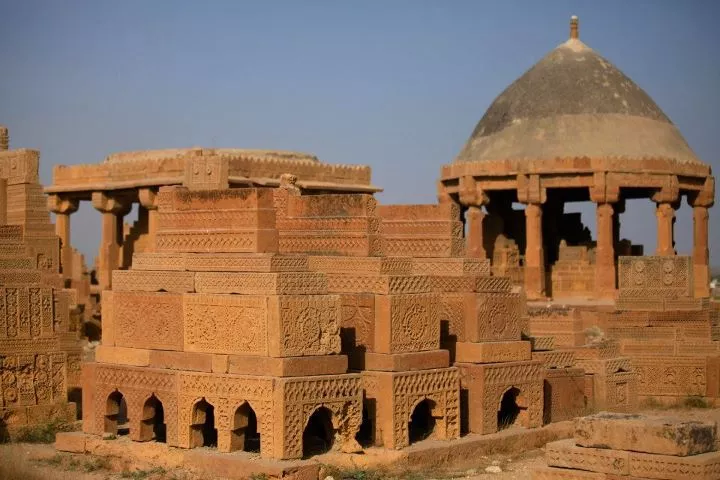Minister blames Punjab for Indus water ‘theft’
Jam Khan Shoro says Indus River water stolen downstream Taunsa Barrage in southern Punjab

Sindh Irrigation Minister Jam Khan Shoro said on Monday that Sindh is suffering 37 per cent shortage of irrigation water as the province's water share is either stolen or lost between Taunsa barrage in Punjab and Guddu barrage in Sindh.
At a press conference at the office of Sindh Irrigation and Drainage Authority (SIDA) in Hyderabad on Monday, Shoro also opposed the construction of new dams and canals in the upstream, pushing the case for investment in high efficiency agriculture.
He emphasised that instead of investing $17 billion on construction of the new dams, only around $2 billion should be spent on the high efficiency farming in Punjab and Sindh and the investment will end up saving up between five to 10 million acre feet (MAF) water. "Why are you trying to buy more jugs when you are not even able to fill the existing two jugs [Tarbela and Mangla dams]?" he questioned.
As per the statistics shared by the minister, Sindh is supposed to receive 180,000 cubic feet per second (cusecs) of water at Guddu Barrage during the current season. But, keeping in view Indus River System Authority (IRSA) calculated overall scarcity of 20 per cent in the country, the province should be getting 144,000 cusecs. Rather, only 117,000 cusecs of water discharge is being recorded at Guddu. "Around 1.2 million to 1.3 million acres of riverine land in Punjab is being cultivated between Taunsa Barrage and Guddu Barrage but it isn't located in Sindh," the minister claimed. "Then why Sindh is made to take this burden."
He deplored that the two flood canals in Punjab, Chashma-Jhelum (CJ) and Taunsa-Panjnad (TP), are being supplied 10,000 cusecs to 12,000 cusecs of water in violation of the 1991 Water Accord. As per accord, the CJ and TP link canals can be allocated water when there is surplus water in the system and that too after taking written permission from the Sindh government, which is the lower riparian.
The provincial minister also opposed the existing exercise of filling Tarbela and Mangla dams, contending that the dams cannot be filled when the provinces are facing scarcity. According to him, the inflow at Tarbela has been recorded at 269,000 cusecs and the outflow at 135,000 cusecs. Likewise, Mangla is receiving 72,000 cusecs and it is releasing only 10,000 cusecs.
Shoro pointed out that crops are sown and harvested earlier in Sindh in comparison to other provinces in the country. He observed that at present water is needed in Badin, Thatta and Sujawal for cultivating the rice crop. He said the Centre has been conveyed in writing that if water is not released immediately for growing rice, the upcoming monsoon rains will make growing that crop almost impossible.
The irrigation minister objected to the role currently being played by IRSA, recalling that its objective under the 1991 accord is to implement that accord. The accord allocated 54 MAF water to Punjab, 48 MAF to Sindh and the remaining to KPK and Balochistan provinces out of the total of 114 MAF available in the system. In the event of the shortfall, all the provinces are supposed to carry an equal burden. However, practically, Sindh is always made to suffer the highest percentage of the shortage.
He reiterated his objection to construction of Jalalpur canal in Punjab, saying the canal and its water allocation had no mention in the accord. The canal is 116 kilometers long and the length of its 23 distributaries is 210 km. Shoro said Jalalpur is of the size of Rohri canal, which is the largest canal in Sindh on the basis of water discharge.
Responding to a question about delay in desilting the canals before the monsoon rains, Shoro said the calamitous rains in 2022 and the rain triggered floods caused 5,400 breaches in the irrigation network in the province. According to him, the irrigation officials have spent the entire year in plugging those breaches without which water supply for farming in the province would not have become possible.
Published in The Express Tribune, June 27th, 2023.



















COMMENTS
Comments are moderated and generally will be posted if they are on-topic and not abusive.
For more information, please see our Comments FAQ